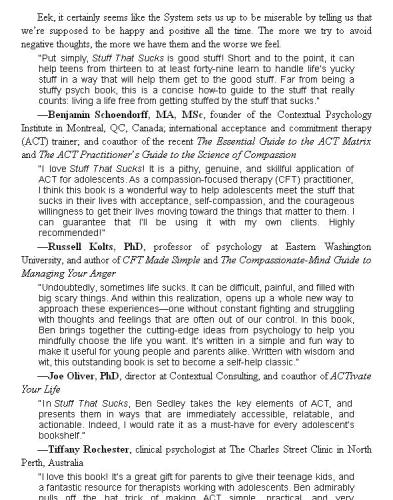
Stuff That Sucks
A Teen's Guide to Accepting What You Can't Change and Committing to What You Can
کتاب های مرتبط
- اطلاعات
- نقد و بررسی
- دیدگاه کاربران
نقد و بررسی

January 2, 2017
In a book first published in the U.K., clinical psychologist Sedley uses the language and tactics of Acceptance and Commitment Therapy (ACT) to encourage teens to recognize the feelings negatively affecting them, and offers tools and ideas for how they can mitigate or otherwise get a handle on them. Sedley doesn’t get much into the specifics of what might have caused the hurt readers are feeling, and he doesn’t need to. Worry, shame, and anger (just some of the “stuff that sucks” covered) can have any number of sources, and the suggestions he proposes—identifying one’s core values, reaching out to friends (or professionals), and trying to think of persistent negative thoughts as annoying rather than day ruining—are broadly applicable. Occasional b&w line drawings are perhaps a tad juvenile for the target audience, but Sedley’s informal but candid tone is consistently reassuring. Ages 13–up.

February 1, 2017
Gr 8 Up-Teens and advice go together like, well, chocolate and sardines. But if a teen were to have a hankering for advice from a book, this might be one to suggest. Using a catchy title, this brief but informative selection presents Acceptance and Commitment Therapy (ACT), which includes a heavy dose of mindfulness, an emphasis on accepting feelings, and a commitment to future goals and methods to change behavior. The author, a clinical psychologist, is well versed in this field and practiced in working with teens. Sedley's approach is viable for those with issues large and small. He provides strategies for self-talk and ideas for dealing with friends, discovering personal values, and overcoming defeatist behaviors. Although the text is laudable, the design isn't. Unfortunately for libraries, there are three pages where readers are asked to write down answers to questions posed. While this volume isn't marketed as a workbook, the write-in feature encourages readers to enter their thoughts, and those entries could influence future ones. Handwritten chapter titles seem to be amateurishly scanned, but serviceable black-and-white illustrations appear throughout. Back matter offers those interested in ACT three additional reading recommendations but no other resources.
Copyright 2017 School Library Journal, LLC Used with permission.

January 15, 2017
A very generalized introduction to acceptance and commitment therapy (ACT).Developed by psychologist Steven Hayes, ACT is designed to help patients move beyond the stresses caused by negative thoughts. Author and clinical psychologist Sedley begins by acknowledging many of the negative emotions that teens may experience: worry, sadness, loneliness, anger, and shame. Then, using a caveman analogy, he explains that human brains are hard-wired to look for danger, which in the modern age is social rejection. ACT contends that breaking the cycle of negative thoughts involves accepting them--rather than focusing on shame about past behaviors or fear about potential future behaviors--and using mindfulness to focus on the immediate moment. The book suggests activities such as listening to music, staring at a body of water, or paying attention to breathing to aid with mindfulness. Sedley also includes a rating scale to help readers discover their personal values, which they can then use when setting goals for working toward a lifestyle that demonstrates these values. The brevity of topic coverage (typically only a page) necessitates a lot of generalization, and readers may find themselves frustrated. The childish, black-and-white line drawings lend the book a distressingly patronizing feel. This may work as an introduction to the concept of ACT, but it's too simplistic to help readers engage in self-directed ACT practices. (Nonfiction. 14-18)
COPYRIGHT(2017) Kirkus Reviews, ALL RIGHTS RESERVED.

























دیدگاه کاربران